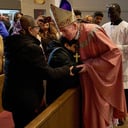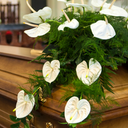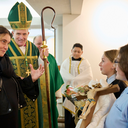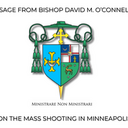Search
News - Essays and Messages RSS Feed
-
- All News
-
-
-
- A Commitment to Healing (18)
- Bereavement Ministry (3)
- Bishop David M. O'Connell, C.M. (2)
- Calls for Advocacy (24)
- Catechetical Writing Series (8)
- Central Communications Group (1)
- Child Protection Archived Articles (1)
- Christian Initiation (1)
- Christmas (9)
- Digital and Social Media (1)
- Employment (4)
- Essays and Messages (498)
- Faith in our Future (28)
- Faithful Citizenship (1)
- Home (1723)
- Homilies (73)
- Independent Victims Compensation Program (2)
- Jubilee 2025 (34)
- La Red Católica de Apoyo (4)
- Media & Events (1)
- News Releases (247)
- Noticias y Novedades (4)
- Office of Child Protection Efforts (3)
- Office of Communications and Media (1)
- Office of the Bishop (1)
- Our Bishop (1)
- Our Co-Cathedral (3)
- Our Diocese Today (623)
- Parish Marriage Ministry (1)
- Respect Life Ministry (11)
- Respect Life Month (3)
- The Monitor (1)
- What is Consecrated Life? (3)
- Word of God Sunday (2)
- World Day of Prayer for Consecrated Life (1)
- Young Saint Series (12)
-
-
 November 19, 2025Mindful of my responsibility as a diocesan bishop to safeguard the integrity and unity of the truths of the faith, moral principles, and ecclesiastical discipline in the works of the apostolate pertaining to health care in the Diocese of Trenton (cf. canons 392, 394, 678, and 747). I, Most Reverend David M. O’Connell, C.M. J.C.D., Bishop of Trenton, by the grace of God and the Apostolic See, hereby issue this General Decree in accord with Canon 29 establishing the Seventh Edition of the United States Conference of Catholic Bishops’ Ethical and Religious Directives for Catholic Health Care Services as particular law in the Diocese of Trenton.Read More
November 19, 2025Mindful of my responsibility as a diocesan bishop to safeguard the integrity and unity of the truths of the faith, moral principles, and ecclesiastical discipline in the works of the apostolate pertaining to health care in the Diocese of Trenton (cf. canons 392, 394, 678, and 747). I, Most Reverend David M. O’Connell, C.M. J.C.D., Bishop of Trenton, by the grace of God and the Apostolic See, hereby issue this General Decree in accord with Canon 29 establishing the Seventh Edition of the United States Conference of Catholic Bishops’ Ethical and Religious Directives for Catholic Health Care Services as particular law in the Diocese of Trenton.Read More -
 November 12, 2025Our faith calls us to see in every person the image of God, and to welcome the stranger as we would welcome Christ Himself. In these times, when so many families and individuals are displaced by war, poverty, or persecution, the Church must be a beacon of compassion and justice.Read More
November 12, 2025Our faith calls us to see in every person the image of God, and to welcome the stranger as we would welcome Christ Himself. In these times, when so many families and individuals are displaced by war, poverty, or persecution, the Church must be a beacon of compassion and justice.Read More -
 November 7, 2025“We remember those who were called upon to give all a person can give, and we remember those who were prepared to make that sacrifice if it were demanded of them in the line of duty, though it never was. Most of all, we remember the devotion and gallantry with which all of them ennobled their nation as they became champions of a noble cause (Ronald Reagan, 40th President of the United States).”Read More
November 7, 2025“We remember those who were called upon to give all a person can give, and we remember those who were prepared to make that sacrifice if it were demanded of them in the line of duty, though it never was. Most of all, we remember the devotion and gallantry with which all of them ennobled their nation as they became champions of a noble cause (Ronald Reagan, 40th President of the United States).”Read More -
 November 5, 2025SNAP cuts have left 400,000 NJ households struggling. In Mercer County, food pantry demand is up 20% in recent weeks.Read More
November 5, 2025SNAP cuts have left 400,000 NJ households struggling. In Mercer County, food pantry demand is up 20% in recent weeks.Read More -
November 4, 2025A doctrinal note is an official teaching document of the Dicastery, intended to clarify and safeguard Catholic teaching on particular questions. Unlike legislative or devotional texts, such notes focus on doctrinal accuracy, offering guidance to bishops, pastors, and theologians as they carry out their teaching mission. They serve the unity of faith by addressing misunderstandings and providing clear reference points for the Church’s life and witness with ecumenical sensitivity.Read More
-
 November 3, 2025I turn to you once again on behalf of the poor and needy. Families in our community and across America are facing hunger as SNAP and WIC benefits end this weekend. Catholic Charities USA is preparing for a surge in need — and we must be ready.Read More
November 3, 2025I turn to you once again on behalf of the poor and needy. Families in our community and across America are facing hunger as SNAP and WIC benefits end this weekend. Catholic Charities USA is preparing for a surge in need — and we must be ready.Read More -
 November 1, 2025The word “vocation” means a “call” and it presumes someone calling and someone called. As Catholics, of course, we identify “the caller” as God himself. In our faith, we believe that God has a plan for each of us and that God calls us, invites us to consider that plan and, hopefully, accept it. Different from merely a job, a “vocation” is all-encompassing, requiring a free and willing response and total commitment to the One who calls and to what is asked of us in that call.Read More
November 1, 2025The word “vocation” means a “call” and it presumes someone calling and someone called. As Catholics, of course, we identify “the caller” as God himself. In our faith, we believe that God has a plan for each of us and that God calls us, invites us to consider that plan and, hopefully, accept it. Different from merely a job, a “vocation” is all-encompassing, requiring a free and willing response and total commitment to the One who calls and to what is asked of us in that call.Read More -
 October 31, 2025As the Church enters the month of November, she invites us to pause, reflect, and lift our hearts toward eternity. This sacred time begins with the Feast of All Saints on November 1 — a radiant celebration of those who have gone before us in faith and now dwell in the light of God’s presence.Read More
October 31, 2025As the Church enters the month of November, she invites us to pause, reflect, and lift our hearts toward eternity. This sacred time begins with the Feast of All Saints on November 1 — a radiant celebration of those who have gone before us in faith and now dwell in the light of God’s presence.Read More -
 October 27, 2025As the Holy Year continues, the Church will celebrate the “Jubilee of the World of Education” in Rome on October 27-November 1 this year. The Jubilee will include several special events: the 60th anniversary celebration of the publication of the Second Vatican Council’s “Declaration on Christian Education (Gravissimum Educationis)” promulgated by Pope St. Paul VI on October 28,1965; the release of a yet to be named commemorative document by our Holy Father Pope Leo XIV regarding Catholic education on that anniversary; and the declaration of St. John Newman as a “Doctor of the Church (November 1, 2025)” and, along with St. Thomas Aquinas, as a “co-patron” of Catholic education.Read More
October 27, 2025As the Holy Year continues, the Church will celebrate the “Jubilee of the World of Education” in Rome on October 27-November 1 this year. The Jubilee will include several special events: the 60th anniversary celebration of the publication of the Second Vatican Council’s “Declaration on Christian Education (Gravissimum Educationis)” promulgated by Pope St. Paul VI on October 28,1965; the release of a yet to be named commemorative document by our Holy Father Pope Leo XIV regarding Catholic education on that anniversary; and the declaration of St. John Newman as a “Doctor of the Church (November 1, 2025)” and, along with St. Thomas Aquinas, as a “co-patron” of Catholic education.Read More -
 October 24, 2025At a recent meeting of the New Jersey Catholic Conference, the issue of the Church’s teaching on assisted suicide was brought up by one of the state’s bishops. While many are familiar with this teaching, it is worthwhile to review, especially as we wind down Respect Life Month.Read More
October 24, 2025At a recent meeting of the New Jersey Catholic Conference, the issue of the Church’s teaching on assisted suicide was brought up by one of the state’s bishops. While many are familiar with this teaching, it is worthwhile to review, especially as we wind down Respect Life Month.Read More -
 October 9, 2025Five months into the first year of his pontificate, our Holy Father Pope Leo XIV has released the first official document of his papacy entitled Dilexi te (“I have loved you”), drawn from the Book of Revelation, 3:9. Addressed to all Christians, Pope Leo’s initial apostolic exhortation places the poor at the heart of the Church’s mission, urging believers to see the poor not simply as recipients of charity but also and more significantly as the motivation and rationale for the Church herself.Read More
October 9, 2025Five months into the first year of his pontificate, our Holy Father Pope Leo XIV has released the first official document of his papacy entitled Dilexi te (“I have loved you”), drawn from the Book of Revelation, 3:9. Addressed to all Christians, Pope Leo’s initial apostolic exhortation places the poor at the heart of the Church’s mission, urging believers to see the poor not simply as recipients of charity but also and more significantly as the motivation and rationale for the Church herself.Read More -
 October 8, 2025Ten years ago, I lost my left leg due to a bone infection and sepsis brought on by diabetes. The circumstances were sudden, the recovery long and the adjustment ongoing. It became a disability that changed my life – but not my calling. Through God’s grace, I have continued to travel throughout the Diocese and fulfill my responsibilities as its bishop. I am deeply grateful for the help I receive as I make my way around the four counties and beyond with what I now call a “limp of grace.”Read More
October 8, 2025Ten years ago, I lost my left leg due to a bone infection and sepsis brought on by diabetes. The circumstances were sudden, the recovery long and the adjustment ongoing. It became a disability that changed my life – but not my calling. Through God’s grace, I have continued to travel throughout the Diocese and fulfill my responsibilities as its bishop. I am deeply grateful for the help I receive as I make my way around the four counties and beyond with what I now call a “limp of grace.”Read More -
 October 1, 2025As Catholics begin the month of October, our hearts turn with renewed devotion to the Blessed Virgin Mary and to one of the Church’s most beloved prayers – the Holy Rosary. For centuries, the Rosary has been a source of grace, peace, and spiritual strength and comfort for the faithful. According to tradition, the Blessed Mother appeared to St. Dominic in 1214, entrusting him with the gift of the Rosary as a powerful weapon against sin and a pathway to deeper union with her Son, our Lord Jesus Christ.Read More
October 1, 2025As Catholics begin the month of October, our hearts turn with renewed devotion to the Blessed Virgin Mary and to one of the Church’s most beloved prayers – the Holy Rosary. For centuries, the Rosary has been a source of grace, peace, and spiritual strength and comfort for the faithful. According to tradition, the Blessed Mother appeared to St. Dominic in 1214, entrusting him with the gift of the Rosary as a powerful weapon against sin and a pathway to deeper union with her Son, our Lord Jesus Christ.Read More -
 September 19, 2025On September 11, 2025, Governor Murphy signed into law a bill (A4085/S3007) legalizing “natural organic reduction,” commonly known as “human composting.” This process offers an alternative to traditional burial by transforming a human body into nutrient-rich soil over several weeks. The body is placed in a specialized vessel with organic materials such as wood chips and alfalfa. Naturally occurring microbes, supported by carefully controlled conditions of moisture, oxygen, and temperature, decompose the body and plant matter into usable soil. Upon completion, the soil is sifted to remove any non-organic materials; the remaining bones are ground into sand-like particles, and the mixture is cured for use in planting trees, flowers, or conservation efforts. New Jersey is the 14th state to pass such legislation, and it becomes effective in New Jersey July 11, 2026.Read More
September 19, 2025On September 11, 2025, Governor Murphy signed into law a bill (A4085/S3007) legalizing “natural organic reduction,” commonly known as “human composting.” This process offers an alternative to traditional burial by transforming a human body into nutrient-rich soil over several weeks. The body is placed in a specialized vessel with organic materials such as wood chips and alfalfa. Naturally occurring microbes, supported by carefully controlled conditions of moisture, oxygen, and temperature, decompose the body and plant matter into usable soil. Upon completion, the soil is sifted to remove any non-organic materials; the remaining bones are ground into sand-like particles, and the mixture is cured for use in planting trees, flowers, or conservation efforts. New Jersey is the 14th state to pass such legislation, and it becomes effective in New Jersey July 11, 2026.Read More -
 September 11, 20252,977 Americans lost their lives on this day 24 years ago, burning the date “9/11” into our rational memory. As we commemorate the tragic events of that day, we remember the 734 souls of our fellow residents of New Jersey killed in the worst terrorist attack in our country’s history and we continue to pray for them and their loved ones.Read More
September 11, 20252,977 Americans lost their lives on this day 24 years ago, burning the date “9/11” into our rational memory. As we commemorate the tragic events of that day, we remember the 734 souls of our fellow residents of New Jersey killed in the worst terrorist attack in our country’s history and we continue to pray for them and their loved ones.Read More -
 September 10, 2025Throughout my years of priestly ministry, I have sat with countless individuals and families—parishioners, clergy, and others—who have entrusted me with their most personal struggles. I have listened to stories of depression, anxiety, addiction, and a wide range of mental health challenges.Read More
September 10, 2025Throughout my years of priestly ministry, I have sat with countless individuals and families—parishioners, clergy, and others—who have entrusted me with their most personal struggles. I have listened to stories of depression, anxiety, addiction, and a wide range of mental health challenges.Read More -
 September 2, 2025On Sept. 7, 2025, Our Holy Father Pope Leo XIV will canonize the first saints of his papacy: Blessed Carlo Acutis (1991-2006) and Blessed Pier Giorgio Frassati (1901-1925). The Church has eagerly awaited these canonizations, each one representing extraordinary holiness among very ordinary young people who lived during the last 100 years; Blessed Pier Giorgio Frassati at their beginning and Blessed Carlo Acutis at their end.Read More
September 2, 2025On Sept. 7, 2025, Our Holy Father Pope Leo XIV will canonize the first saints of his papacy: Blessed Carlo Acutis (1991-2006) and Blessed Pier Giorgio Frassati (1901-1925). The Church has eagerly awaited these canonizations, each one representing extraordinary holiness among very ordinary young people who lived during the last 100 years; Blessed Pier Giorgio Frassati at their beginning and Blessed Carlo Acutis at their end.Read More -
 August 27, 2025AS BISHOP OF THE DIOCESE OF TRENTON AND A LIFE-LONG CATHOLIC EDUCATOR, I call upon all clergy and faithful of the Diocese to unite in prayer for the victims, families, and entire community of Annunciation Catholic School in Minneapolis, who now face the unimaginable in the wake of yet another school shooting.Read More
August 27, 2025AS BISHOP OF THE DIOCESE OF TRENTON AND A LIFE-LONG CATHOLIC EDUCATOR, I call upon all clergy and faithful of the Diocese to unite in prayer for the victims, families, and entire community of Annunciation Catholic School in Minneapolis, who now face the unimaginable in the wake of yet another school shooting.Read More -
 August 21, 2025Our Holy Father Pope Leo XIV has asked Catholics throughout the world to join him in a day of prayer and fasting for peace tomorrow, August 22, the Feast of the Queenship of Mary. Established as a Marian feast to follow the Solemn Feast of the Assumption by Pope Pius XII in 1954, Pope Leo explained...Read More
August 21, 2025Our Holy Father Pope Leo XIV has asked Catholics throughout the world to join him in a day of prayer and fasting for peace tomorrow, August 22, the Feast of the Queenship of Mary. Established as a Marian feast to follow the Solemn Feast of the Assumption by Pope Pius XII in 1954, Pope Leo explained...Read More -
August 14, 2025Our Church mourns the terrible suffering of Christians and other innocent victims of violence in Gaza and surrounding areas who are struggling to survive, protect their children, and live with dignity in dire conditions. The Holy Father continues to call for a cease fire and for aid to enter the territory, noting with great sorrow that “Gaza is starving.”Read More
See More

 Translate
Translate